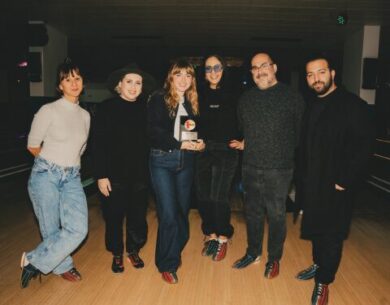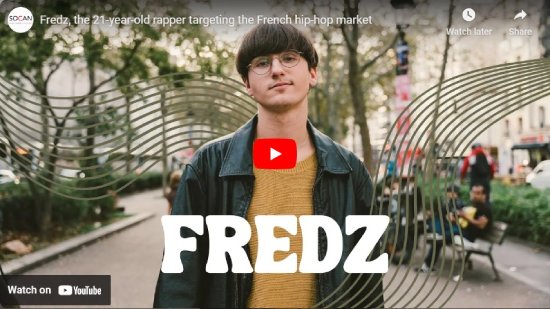Breaking into the market in France is a challenge for Québec artists. The way to achieve success over there varies from artist to artist, depending on their musical style, and the outcome they seek. We invite you behind the scenes, to look at the export strategies of several SOCAN’s members as they try to establish a lasting foothold in the French marketplace.
Klô Pelgag: Regaining the hearts of French audiences, one album at a time

Jean-François Guindon, of Les Productions Subites
For Jean-François Guindon, Klô Pelgag’s agent, to develop an artist overseas, you first need to build a strong professional network. Klô’s experience is a good example of the potential, and the hurdles, of a bi-continental career. In the beginning, it was her showcases, notably the ones presented at RIDEAU, that attracted the attention of producers from France to the work of the singer-songwriter. “The French team Zamora saw Klô at RIDEAU and decided to invest in her,” says Guindon. “That played a key role for bookings in France.” That local connection, crucial to establishing a presence overseas, is the main logistical and financial challenge for Québec artists.
Showcases, however, aren’t enough on their own: “Presenting a showcase without a local team is like sowing without soil. You need people to carry the baton, and maintain a constant presence,” says Guindon. Klô Pelgag’s first tours in France in 2014 were as necessary as they were taxing. “We’d travel two or three times a year, often at a deficit, because the costs were exploding, especially with such an extensive stage band.” Despite the financial support of Musicaction and SODEC, funding remains precarious, because costs have skyrocketed since the pandemic.
But for an artist, not having actual feet on the ground complicates things further. It hasn’t escaped Guindon that if Klô had a prolonged presence in Europe, it could’ve accelerated her development there: “If she could’ve lived there for six to 12 months, there’s no doubt her impact would’ve been much greater.”
Therefore, despite selling out venues in Paris and in Northern France, each step is a new beginning. “Nothing is ever a given. We’re trying to penetrate the ‘musique actuelle’ networks with her most recent albums,” says Guindon, “but that involves educating programmers and re-learning the codes.” Pelgag’s musical evolution from “chanson française” to this new direction illustrates the tension between the past and the present: “We want crowds standing on their feet during our shows, a higher level of live energy, but that entails re-orienting our strategy to attract a new audience.”
At the heart of every question remains the financial concern: is it worth it? “Klô has die-hard fans on both sides of the Atlantic, so it’s a gamble that may be worth it,” he says, but adds that it also depends on an artist’s capacity to adapt and take risks. “The more risks you take, the better your odds are that it will pay off.”
Guindon is quick, however, to highlight the differences between the ecosystems in Québec and France: “In France, local artists dominate the streaming platforms, but over here, it’s international artists, mostly. Pushing an artist from Québec in France requires that you have a solid grasp and understanding of their codes, and their social media, to convince an audience that has a habit of listening to local artists.”
Fredz: Consistency and persistence on social media
Up-and-coming rapper Fredz has established himself as a promising figure on Québec’s ebullient music scene, and he’s already quickly and massively won the hearts of audiences in France. His unique style combines Francophone pop and rap, and he’s established himself as a bridge between Québec, France, and even the U.S.
“I’ve done four multi-city tours in France: Paris, Toulouse, Lyon, Marseille… all the major cities. Everything was sold out during the last year,” says Fredz proudly. His biggest moment on stage? “A 1,500-capacity gig at La Cigale in Paris. That was my biggest show in France.”
His meteoric path over there is intricately tied to his ability to adapt to the particulars and expectations of European audiences. “My song ‘Le stade’ started playing on NRJ just before Christmas,” says Fredz. “It’s the biggest radio station. That’s a major step.” Europe is a vital market for him, with 70% of his streams coming from France, and a sizable portion from Belgium and Switzerland as well.
Fredz credits this success, in large part, to a well-considered digital strategy. “I got a natural boost in France because of the algorithms,” he says. “I did a lot of short videos, and the fact that I don’t have a Québécois accent when I sing led French audiences to think I was one of them,” he says with a giggle. This approach is supported by the fact that he systematically spends two days a week creating content specifically for France, by integrating the expressions and cultural cues typical to European audiences.
Musically, Fredz insists on the importance and scope of his lyrics. “I write all my words, and I pay a lot of attention to the fact that they have to have a value,” he says. “I show up with a universe at the crossroads of Québec and the United States, and that’s like a breath of fresh air in France.” The young artist is also very conscious of the challenges that come with having lasting success in France, because of the constantly evolving nature of that market. He believes nothing can ever be taken for granted. “If you don’t re-invent yourself in that market, you can go from sold-out venues to half-full ones in no time,” he warns.
But that doesn’t slow Fredz down. He’s currently planning his next European tour, which will culminate with a stop at the legendary 2,000-seat Olympia in Paris. There will be dates on the festival circuit in Europe and Québec next summer, and a new album that’s slated for release in the fall. Working in the studio with songwriters from outside his circle for the first time, he’s exploring new sounds, while carefully preserving the authenticity that won him his fan base. Fredz continues to blaze his own trail by combining ambition, introspection, and a deep connection with his audience, both locally and internationally.
Aliocha Schneider: Invest in yourself and in the territory
Aliocha Schneider has experienced skyrocketing popularity in France, a market that’s difficult for Québec artists to penetrate. Schneider sold out the Olympia in Paris, a milestone he calls “a dream come true.” His song “Ensemble,” which has garnered tens of millions of streams, and his 2023 eponymous album, both opened the doors to households in France, and established him as a permanent fixture on the local music scene.
A unique artistic offering underpins his success. “There was a space up for grabs in the folk singer-songwriter genre in France,” he says. “That’s where I step in with my Québécois baggage and influences.” Schneider also benefitted from the exposure provided by an SNCF advertising campaign (France’s national state-owned railway company), which propelled “Ensemble” onto the airwaves, and into everyone’s mind. RTL2, France Bleu, and Europe 2 are among the many radio broadcasters who support him.
The fact that Aliocha has settled in France for the long term allows him to “almost give the illusion” that he’s a French citizen because he’s always at the ready if an opportunity arises. Yet, despite all this, things weren’t always easy. “My second album [Naked, in 2020] didn’t find its audience in France, and no one was showing up for my shows outside of Paris,” he admits. Not one to give up, he relied on a French record label, and multiplied his live appearances to consolidate his audience through pure, relentless, hard work.
He’s earned three nominations at the 40th Victoires de la musique [the French Grammys]: Male Breakthrough Artist, Live Show Breakthrough Artist, and Song of the Year for “Ensemble,” and the gala will take place on Feb. 14, 2025.
“Québec will always be the place I call home, but France is giving me amazing opportunities right now, and I don’t want to miss a single one,” says the young artist, who’s finding the right balance between his Québec roots and his European outreach. Despite his ambition to play sold-out shows in venues such as the Zénith (with a capacity of nearly 7,000), Aliocha is still very fond of the intimacy of small venues, where his connection to the audience is much stronger. He can hardly contain his enthusiasm to get back to Montréal next summer to play MTelus (2,000 capacity). “Just a few years ago, I could never have imagined that someone would pick that stage for me to play in Montréal, and that also matters a lot to me,” he says.
Patrick Watson et Billie du Page : Right place, right time

Photo: Marie-Michèle Bouchard. Left to right: Elfy Andrade of Opak, BAYLA, Billie du Page, Sara Dendane (SOCAN) Eric Parazelli (SOCAN), lucatheproducer
Based in Montréal, Opak is a company that represents artists for management and the production of live shows and tours. Among its clients are Aliocha, Patrick Watson, and up-and-comer Billie du Page.
Elfy Andrade manages artists for Opak, and says export strategies need to be tailored on a case-by-case basis. In Aliocha’s case, this hinges on his constant presence in Europe. “If you want to make it in Europe, you must put in the effort of being there, and that’s true as a manager as much as it is for artists,” she insists. “Aliocha case is a good example of this. He settled in Paris; he benefits from a local network and from a European consultant who helped unlock crucial opportunities, like collaborations with local labels and partners.”
But she adds that being there doesn’t translate into guaranteed success. “You also need to be strategic, and to have a musical offering that transcends genres,” says Andrade. She believes that audiences in France are demanding, and aren’t content with the simple fact that an artist is from Québec: “In France, the music has to speak for itself above all else. There is a Québec-France friendship, but that’s not enough.”
For Patrick Watson, who’s maintained his base in Québec, collaborations with European artists and teams have played a key role. “He’s developed a loyal fan base over several years of progressive market penetration, and also through collaborations such as the one with French artist November Ultra,” says Andrade. “It’s another way of entering the market without having to move there.”
Andrade and her team chose a different approach for Billie du Page. “Billie is just starting her career, so we’re basically testing the waters,” she says. “We’re using showcase opportunities like the Printemps de Bourges and MaMA to gauge her potential on the French market. We’ve also relied on targeted ad campaigns on TikTok and Instagram.” The initial results are promising. and there’s notable interest in terms of the number of streams, and crowd engagement during live shows.
Each artistic project requires a bespoke strategy. As Andrade suggests, Patrick Watson’s music is more cinematic and emotional, and therefore reaches a more niche market, but it also has a more universal reach. At the other end of the spectrum, Billie du Page’s slick pop aesthetic and catchy tunes target a much wider audience. “France’s demographic density allows for even niche projects to thrive, but in Billie’s case, we’re targeting mass media and digital platforms. Each artist requires very precise planning, adapted to their aesthetic and goals,” she explains.
Collaborations provide essential leverage for Québec artists who want to break into the European market. Andrade gives the example of Billie du Page opening for Cœur de pirate in France. “It was an undreamt-of opportunity, yet it was well planned. Such collaborations boost visibility and are opportunities to meet the right partners,” she says.
Andrade says exporting musical projects is never an exact science, and is always a long-haul endeavour. “Each territory has its specifics, and you need to be ready to adapt, while capitalizing on what makes an artist unique,” she says. The future of Québec artists on the European scene is still possible, thanks to increasingly refined strategies. One just needs to find the right shoe for each foot.

